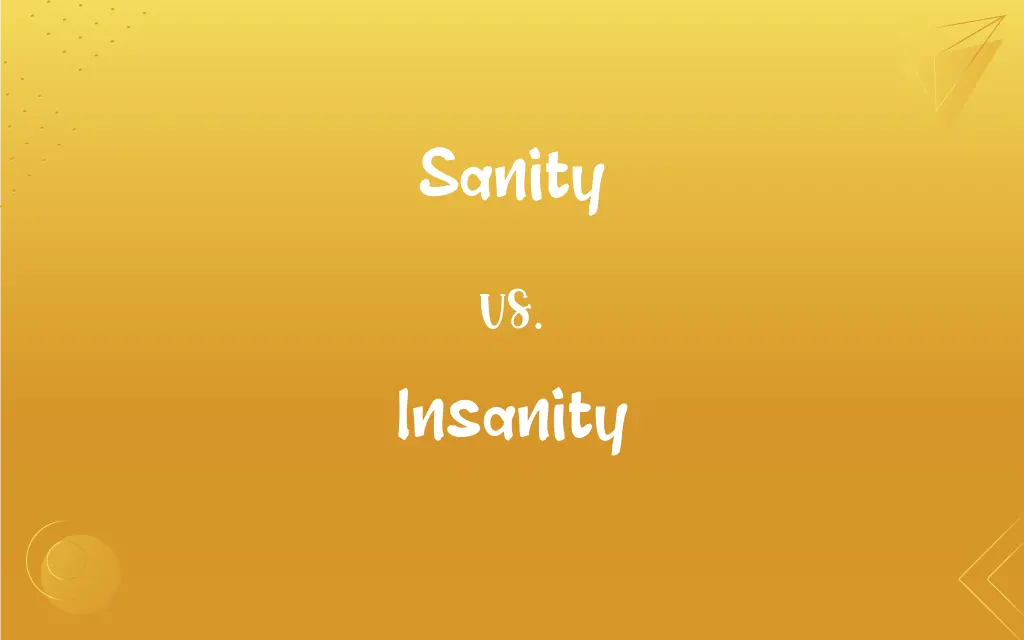Sanity vs. Insanity: What's the Difference?
Edited by Harlon Moss || By Janet White || Published on November 8, 2023
Sanity refers to a sound and healthy mental state, while insanity denotes a severe mental disorder or lack of rational thinking.

Key Differences
Sanity and insanity are terms that address the state of one's mental health or cognition. Sanity represents a state of mental health where an individual can think rationally, make logical decisions, and distinguish between reality and imagination. On the other hand, insanity often denotes a state where these abilities are compromised, leading to irrational thinking or behavior.
In legal contexts, sanity and insanity play pivotal roles. An individual's sanity is often associated with their capacity to understand their actions, the consequences thereof, and distinguish right from wrong. Conversely, insanity in legal terms can serve as a defense, suggesting that an individual was not in a rational state of mind during the commission of an offense, and therefore might not be held fully accountable.
From a societal perspective, sanity often aligns with behaviors and thoughts deemed "normal" or "acceptable" by the majority. Those who deviate might be viewed as "insane" or "eccentric." However, it's crucial to note that societal norms vary across cultures and epochs. Thus, what one society labels as insanity might be viewed as a mere divergence from the norm or even completely normal in another context.
Medical professionals usually avoid the term "insanity," favoring more specific diagnoses that describe particular mental health conditions. In this light, sanity can be viewed as the absence of such conditions, while insanity might refer to the presence of severe mental disorders. However, it's essential to approach these terms with care and avoid labeling or stigmatizing individuals based on perceived mental health states.
Comparison Chart
General Definition
Soundness of mind
Lack of rational thinking or severe mental disorder
ADVERTISEMENT
Legal Relevance
Ability to discern right from wrong
Might be used as a defense in criminal cases
Societal Perception
Conforms to societal norms
Deviates from what is deemed "normal"
Medical Reference
Absence of severe mental disorders
Presence of specific mental health conditions
Judgment Basis
Based on rationality and logical thinking
Often based on irrational behavior or thought
Sanity and Insanity Definitions
Sanity
The ability to think and behave rationally.
The decision raised questions about his sanity.
ADVERTISEMENT
Insanity
A state of severe mental illness.
The patient was diagnosed with a form of temporary insanity.
Sanity
Soundness of mind and emotions.
Meditation helped her maintain her sanity during stressful times.
Insanity
Behavior that deviates significantly from the norm.
He committed the act in a moment of insanity.
Sanity
Conformance to societal norms or standards.
He questioned the sanity of societal expectations.
Insanity
A legal term suggesting lack of responsibility due to mental disorder.
His lawyers pleaded insanity in the court case.
Sanity
The condition of being mentally sound or stable.
Her sanity was a beacon for those around her during crises.
Insanity
Irrationality or lack of sound judgment.
It would be insanity to go hiking during a thunderstorm.
Sanity
A state free from mental illness.
The therapy helped restore her sanity after traumatic events.
Insanity
Severe mental illness or derangement. Not used in psychiatric diagnosis.
Sanity
The quality or condition of being sane; soundness of mind.
Insanity
Unsoundness of mind sufficient to render a person unfit to maintain a contractual or other legal relationship or sufficient to warrant commitment to a mental health facility.
Sanity
Soundness of judgment or reason.
Insanity
Incapacity to form the criminal intent necessary for legal responsibility, as when a mental disorder prevents a person from knowing the difference between right and wrong.
Sanity
The condition of being sane.
Preserve one's sanity
Lose your sanity
Decree someone's sanity
Insanity
Incapacity because of a mental disorder to participate adequately as a defendant in criminal proceedings or to understand the imposition of a criminal punishment, particularly the death penalty.
Sanity
Reasonable and rational behaviour.
Insanity
Extreme foolishness or irrationality
"The insanity of sending troops into Russia when European peace looked imminent horrified him" (Mary V. Dearborn).
Sanity
The condition or quality of being sane; soundness of health of body or mind, especially of the mind; saneness.
Insanity
Something that is extremely foolish, distinctly irrational, or wildly excited
"twisted forms of musical insanity" (Christopher J. Kelter).
Sanity
Normal or sound powers of mind
Insanity
The state of being insane; madness.
The defendant pleaded insanity in the hope of getting a reduced sentence.
Insanity
The state of being insane; unsoundness or derangement of mind; madness; lunacy.
All power of fancy over reason is a degree of insanity.
Without graceThe heart's insanity admits no cure.
Insanity
Such a mental condition, as, either from the existence of delusions, or from incapacity to distinguish between right and wrong, with regard to any matter under action, does away with individual responsibility.
Insanity
Relatively permanent disorder of the mind
Insanity
Extreme folly or senselessness.
The insanity of the decision became clear over time.
FAQs
Is insanity a medical diagnosis?
No, medical professionals use specific diagnoses rather than the broad term "insanity."
Can societal views on sanity change over time?
Yes, societal perceptions of sanity can evolve based on changing norms and values.
Can stress impact one's sanity?
Yes, prolonged stress can impact mental well-being and perceptions of sanity.
What does insanity mean in legal terms?
In legal contexts, insanity can indicate that an individual wasn't in a rational state when committing an offense.
How do cultures differ in their views on sanity?
Different cultures have varied norms and beliefs, influencing their definitions of sanity and insanity.
How is sanity commonly defined?
Sanity is often defined as soundness of mind and the ability to think rationally.
Are sanity and intelligence related?
While both pertain to cognitive functions, sanity focuses on mental health, whereas intelligence relates to cognitive abilities.
What might cause temporary bouts of insanity?
Traumatic events, extreme stress, or certain substances can lead to temporary lapses in rational thinking.
How did historical societies view insanity?
Historical views on insanity varied, with some cultures seeing it as divine punishment and others as a medical condition.
How do sanity and consciousness relate?
While consciousness refers to awareness, sanity pertains to the soundness of one's mental state.
Are there degrees of insanity?
While not formally categorized, mental health conditions vary in severity and manifestation.
Is there a test to determine sanity?
Psychologists use various assessments to gauge mental health, but no single "sanity test" exists.
Can artistic genius and insanity be linked?
While some artists have faced mental health challenges, it's an oversimplification to broadly link genius and insanity.
Is it possible to be sane in one context and insane in another?
Given the varied definitions across cultures and situations, one's mental state can be perceived differently in different contexts.
How is insanity portrayed in media?
Media often sensationalizes insanity, which can lead to misunderstandings and stigmas.
Can someone regain their sanity after a mental breakdown?
Yes, with appropriate therapy and support, many can recover from mental health challenges.
Can environment contribute to insanity?
Yes, environmental factors, traumatic experiences, and societal pressures can influence mental health.
Why is it essential to differentiate between sanity and insanity in legal cases?
It can determine accountability and the kind of legal or therapeutic intervention needed.
Can medication help restore sanity?
Medication can help manage specific mental health conditions, potentially aiding in restoring a sense of well-being.
What role does genetics play in sanity?
Genetics can influence susceptibility to certain mental health conditions, impacting perceptions of sanity.
About Author
Written by
Janet WhiteJanet White has been an esteemed writer and blogger for Difference Wiki. Holding a Master's degree in Science and Medical Journalism from the prestigious Boston University, she has consistently demonstrated her expertise and passion for her field. When she's not immersed in her work, Janet relishes her time exercising, delving into a good book, and cherishing moments with friends and family.
Edited by
Harlon MossHarlon is a seasoned quality moderator and accomplished content writer for Difference Wiki. An alumnus of the prestigious University of California, he earned his degree in Computer Science. Leveraging his academic background, Harlon brings a meticulous and informed perspective to his work, ensuring content accuracy and excellence.






































































